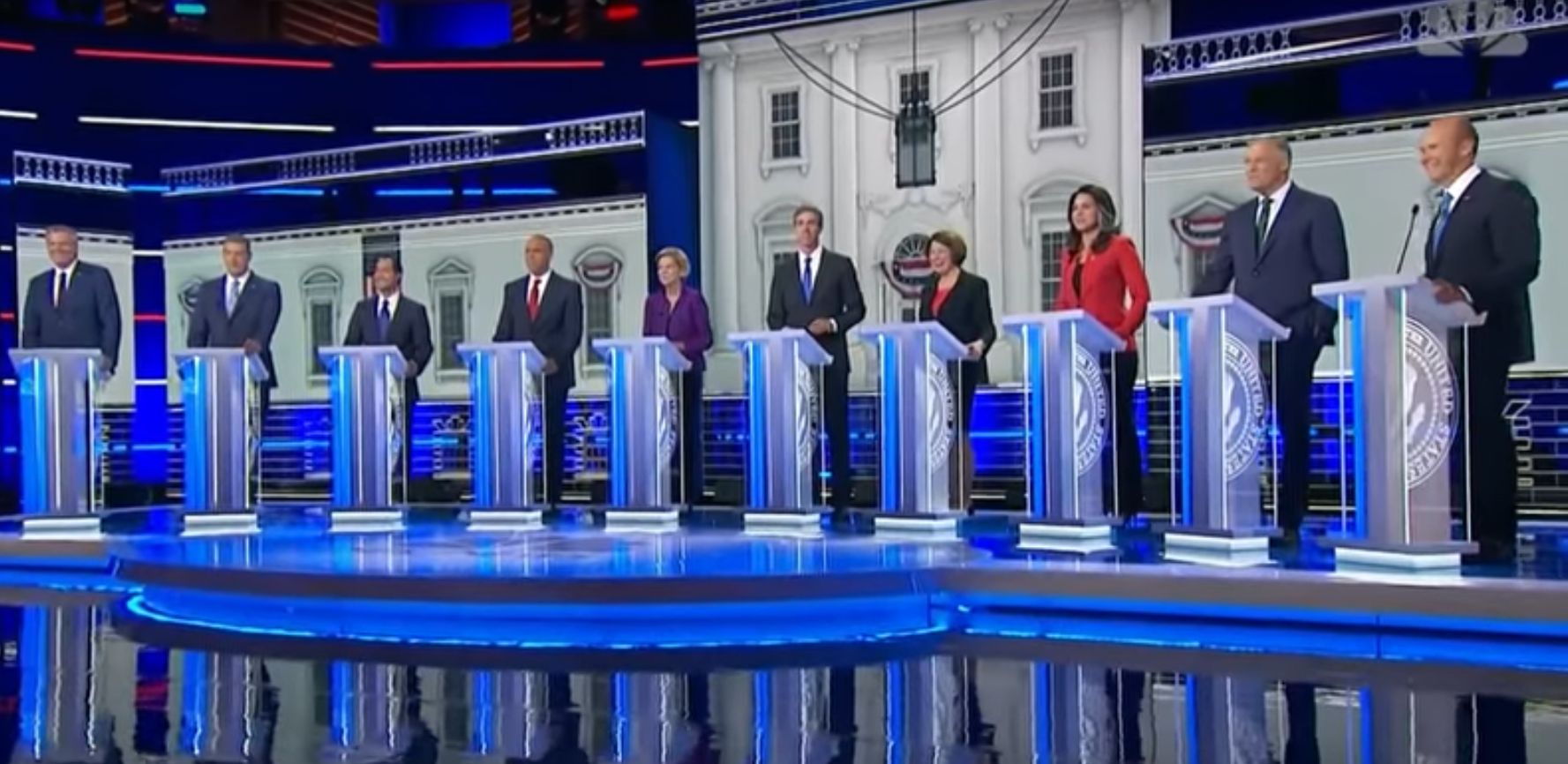What Still Wasn’t Said in Democratic Debate Night #2
By
Ashik Siddique
Posted:

Another ten candidates for the 2020 Democratic presidential nomination answered questions last night in the second of back-to-back debates.
The contenders and moderators said a bit more about our government’s highly militarized current priorities than last night, but still left much to be desired. Here’s what they did bring up in the second debate compared to the first – and what more they should have.
Ending Forever Wars
Discussion of our country’s forever wars was muted on both nights, though some candidates did make more substantive comments in the second debate.
Joe Biden and Tulsi Gabbard said combat troops should be removed from Afghanistan, Pete Buttigieg called for “an end to endless war,” and Tulsi Gabbard, Kristen Gillibrand, and Bernie Sanders specifically discussed the present need to avoid a disastrous war with Iran, which would be likely to cost more than the Iraq and Afghanistan wars.
All of these conflicts deserve much more discussion. At a time when the U.S. is “combatting terrorism” in 40 percent of the world’s nations, it’s well worth unpacking whether candidates propose to continue this utterly unsustainable situation, or how they propose to wind it down.
The Militarized Domestic Budget
Moderators prompted candidates to discuss gun violence on both nights, and many made strong commitments to limit assault weapons. Pete Buttigieg described these as weapons of war that “have absolutely no place in American cities or neighborhoods in peacetime, ever.”
But what about some discussion of how this country’s militarized budget creates an overall atmosphere of violence, not limited to the easy availability of guns to civilians? Democratic candidates broadly agree on limiting the availability of weapons to civilians, but what about programs like the Department of Defense’s 1033 program, which sends surplus military gear to police departments all over the country at virtually no cost to local police forces, including ammunition, guns, armored vehicles, and grenade launchers?
Military equipment has no place in our city streets. Removing this equipment from police departments and ending the 1033 program, which was briefly done during the Obama administration before its restoration in 2017, would be a major step toward addressing the violence of the criminal justice system in the U.S., which further entrenches systemic racism by disproportionately targeting, arresting, and incarcerating people of color.
Tackling Climate Chaos
After meriting not even a single question in the general election debates in 2016, climate change came up on both nights of the first debate. But moderators didn’t devote more than eight minutes to the existential threat in either two-hour session, and candidates largely avoided specifics about how to address the scale and urgency of the crisis.
How do candidates propose to decarbonize the entire economy on a timeframe that matches climate reality? It’s a great start to shout out a Green New Deal, as 3 of the 20 candidates did. But sooner or later, a reasonably ambitious climate-saving program in the U.S. will have to tackle the reality of the Pentagon’s enormous carbon footprint.
Bernie Sanders came close to acknowledging that last night, saying that the president should “tell the rest of the world that instead of spending $1.5 trillion on weapons of destruction, let us get together for the common enemy and that is to transform the world energy system away from fossil fuel to energy efficiency, and sustainable energy.”
That $1.5 trillion figure could refer to the 55-year lifespan cost of the F-35 fighter jet, just one wasteful Pentagon program currently funded by taxpayers. Or it could refer to the annual cost of global military spending, which falls within that ballpark: in the past year alone global military expenditures hit a total of $1.82 trillion, with the U.S. military budget representing more than a third of that, bigger than the next 7 countries combined. Meanwhile, the UN’s Green Climate Fund has only mobilized a fraction of its $100 billion goal to help developing nations deal with climate change.
In any case, the stated priority is one that could use much more expansive political discussion in the United States: it’s time to demilitarize the federal budget to fight climate change.
Pentagon Spending
In the first debate, Tim Ryan alluded broadly to how military flare-ups "distract us from the real problems in the country." Tulsi Gabbard more pointedly referred to the "terribly high cost of war," calling for reinvestment in domestic needs like healthcare and a green economy instead of "tossing out trillions of our hard-earned taxpayer dollars and countless lives."
But the full Pentagon budget didn’t come up at all on either night – even as Congress haggles over an NDAA to honor the current administration’s request to increase the current budget from $716 billion to a monstrous $750 billion.
7 out of 9 candidates at last week’s Poor People’s Moral Action Congress presidential forum went on the record to support Pentagon spending cuts, and all of those heard our call to cut as much as $350 billion per year from the military to fund priorities that actually meet human needs. Marianne Williamson was the only candidate who committed to that number, but none of the candidates in the first debate mentioned the total Pentagon budget at all.
There’s a long slog ahead before the actual primaries begin next year. That’s a lot of time to get real answers to systemic crises from candidates – if we really press them.